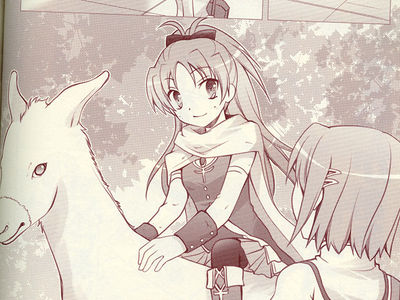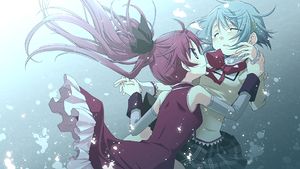Talk:Ophelia: Difference between revisions
m (Created page with "[[File:Kyouko riding some animal doujin art.jpg|right|thumb|400px|<s>A White Knight in shinning armor riding her noble steed to sweep off her feet her lovely maiden.</s> A mercen...") |
No edit summary |
||
| Line 44: | Line 44: | ||
File:Ophelia fanart witch form.jpg | File:Ophelia fanart witch form.jpg | ||
</gallery> | </gallery> | ||
==Her Nature== | |||
Can we get some confirmation as to what her nature is? The kanji for her nature translates to 'despair; desperation; abandonment' | |||
Self-abandonement is defined as "the action of completely surrendering oneself to a desire or impulse." Should we make a section to clarify the nature? [[User:SPDUDE48|SPDUDE48]] 18:23, 21 April 2012 (UTC) | |||
Revision as of 18:23, 21 April 2012
The Witch's Name is Ophelia. --SPDUDE48 11:51, 22 February 2012 (UTC)
- So Japan doesn't want people to forget about Kyouko's death. Of course they'd pick the name of a woman who had one of the most famous and romanticized suicides in western literature. --randomanon 12:08, 22 February 2012 (UTC)
- Doesn't the name Ophelia seem more suitable for Sayaka? --SPDUDE48 12:55, 22 February 2012 (UTC)
- They can't change Oktavia now that it's been chosen. Personally, I don't think Ophelia is really suited for Kyouko but I see where they may think it fits aside from the manner of death. Ophelia goes mad after her father dies and she's spurned by her love interest. For Kyouko to go witch, probably both those events happened (e.g. if you perceive Sayaka as her love interest). --randomanon 13:05, 22 February 2012 (UTC)
- Considering we dont know as of yet what triggered the transformation, it could be possible something along those lines could trigger it... --Mutopis 23:33, 22 February 2012 (UTC)
- Oh . . From Shakespeare's Hamlet. But how was her death famous and romanticized? --SPDUDE48 12:31, 22 February 2012 (UTC)
- Let me put it this way. How many women can you name off the top of your head who are famous for committing suicide? What names come to mind first? --randomanon 12:32, 22 February 2012 (UTC)
- Yep, I agree... --Mutopis 12:35, 22 February 2012 (UTC)
- Well Juliet for starters. Sorry, I'm really not that familiar with Hamlet --SPDUDE48 12:35, 22 February 2012 (UTC)
- I see. Well Ophelia's death and the imagery of her body floating in the water is well-known in literature like Hamlet is for his soliloquy. Juliet's death is not what makes her famous but rather her relationship with Romeo as star-crossed lovers. Cleopatra also reportedly committed suicide, but that's not what she was known for so much as her manner of living and her famous relationships with Roman emperors. Whereas Ophelia's death is what she's really known for. --randomanon 12:49, 22 February 2012 (UTC)
- Let me put it this way. How many women can you name off the top of your head who are famous for committing suicide? What names come to mind first? --randomanon 12:32, 22 February 2012 (UTC)
- They can't change Oktavia now that it's been chosen. Personally, I don't think Ophelia is really suited for Kyouko but I see where they may think it fits aside from the manner of death. Ophelia goes mad after her father dies and she's spurned by her love interest. For Kyouko to go witch, probably both those events happened (e.g. if you perceive Sayaka as her love interest). --randomanon 13:05, 22 February 2012 (UTC)
- Will an Ophelia page be created soon? --Mutopis 12:36, 22 February 2012 (UTC)
- I hope we get pictures regarding her familiars and her witch labyrinth... --Mutopis 12:44, 22 February 2012 (UTC)
- If you want, although we have no info on the character yet so it seems premature. --randomanon 12:49, 22 February 2012 (UTC)
There'd better be fanart of her with Oktavia. --68.199.49.45 00:07, 23 February 2012 (UTC)
- There is something beautiful yet haunting about that... --Mutopis 23:43, 23 February 2012 (UTC)
I wonder if the reason Kyouko is riding a horse is somehow related to the unicorn symbol that appeared in the blu-ray version? If I were to interpret it, either it is a unicorn that lost its horn, or perhaps one can interpret the rider carrying a lance as part of the horn, I am just guessing... maybe there is something symbolic about it or maybe not... --Mutopis 10:30, 24 February 2012 (UTC)
- Maybe you are right. I was thinking that perhaps unicorn represent "innocence". Losing the horn means the lost of that innocence. Kyouko was innocent and always thought about doing justice and helping other like a legendary knight but then, Kyouko lost that innocence when his father murdered the whole family and branded her a witch. Perhaps the guilt she carried with her due to her failure to protect her family and later, Sayaka weighted too much for her causing her to turn into a witch. Demonicslayer 13:44, 24 February 2012 (UTC)
Observation from /a/:
Ophelia was a character who's main conflict was obeying her Father or her abusive love interest. She had a fear of intimacy and eventually cracks under all of the pressure everyone puts on her in the play. As for her death
Regardless of whether or not Gertrude was an eyewitness, the story of Ophelia's death is striking in a number of ways. First, her death seems to be passive: rather than straight-up committing suicide, as Gertrude tells us, she accidentally falls in the water and then simply neglects to save herself from sinking. This seems to be a metaphor for the way Ophelia lives her life toward the end of the play – going with the flow, doing what her father tells her to do, rather making decisions for herself. Ophelia's "garments" "pull" her down, as if they had a mind of their own.
We also notice that Ophelia is described as being "mermaid-like" with her "clothes spread wide." Even in death, Ophelia is figured as an erotic creature. Gertrude also suggests that Ophelia's drowning was natural when she describes Ophelia as being like a "native" creature in the water. This seems like a pretty dangerous and destructive way to describe a young woman's tragic death, don't you think?
Drowning
I got this from 4chan and thought to post this here so we can add it later to the Ophelia page at a later time. --Mutopis 08:35, 24 February 2012 (UTC)
Well the famous Ophelia in literature is the one from Hamlet, a potential wife of his. She ends up killing herself by drowning, and it's a famous death represented in various paintings, probably most famously (or at least to me, since my friend's mom has a copy in her house) is the Millais one.
Her drowning could link to Sayaka's water theme, that she went where Sayaka was (in her mermaid form, in water) but drowned in the process. Also Ophelia is linked to regret and, I think, unrequited love. As for the tendency for German literature references in Madoka, aren't they all (or almost all) from Goethe's Faust? The reason for that seems to be the obvious one; that they're both about making a deal with a devilish character that doesn't give you the whole story, with the deal heavily stacked in his favour.
Gallery
- Ophelia form human fanart badass.jpg
- Ophelia fanart witch form.jpg
Her Nature
Can we get some confirmation as to what her nature is? The kanji for her nature translates to 'despair; desperation; abandonment'
Self-abandonement is defined as "the action of completely surrendering oneself to a desire or impulse." Should we make a section to clarify the nature? SPDUDE48 18:23, 21 April 2012 (UTC)

